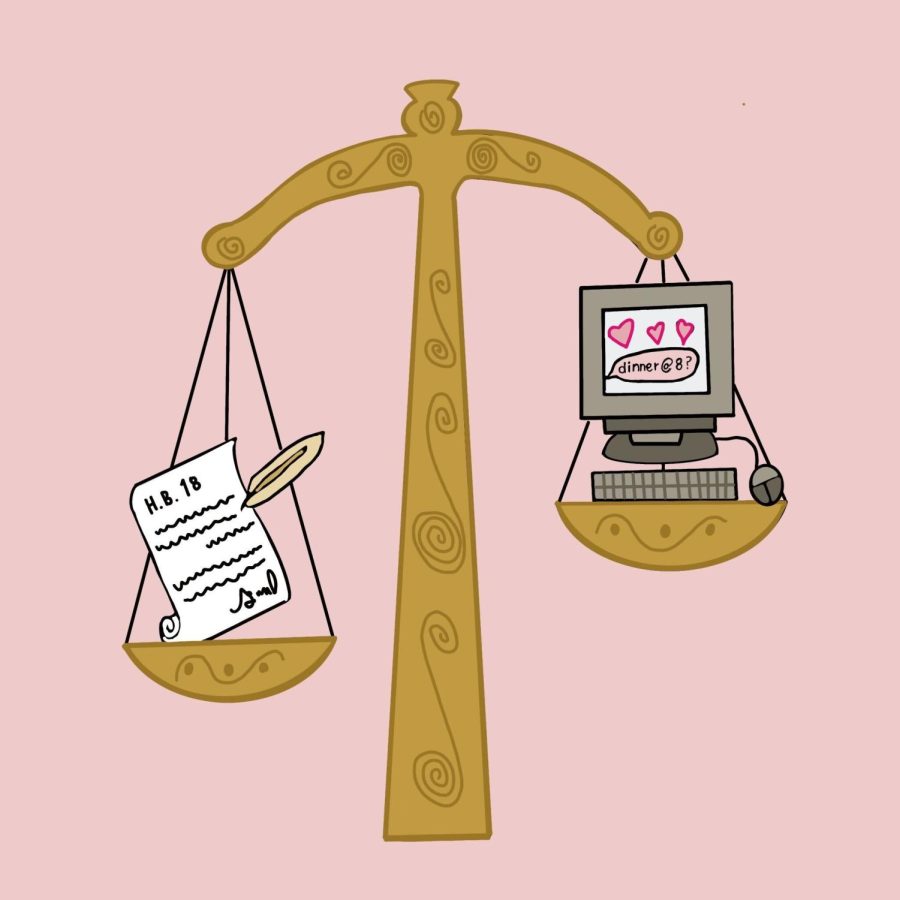Cushman: H.B. 18 Isn’t Enough to Make Online Dating Safer
(Graphic by Brenda Payan-Medina | The Daily Utah Chronicle)
February 2, 2023
Journalist and author Nancy Jo Sales has long criticized dating apps for making people feel worse through gamification of relationships. Sales argued that dating apps make users feel disposable, and many college students and twenty-somethings can relate. But there is a darker side to online dating: These apps have the potential to endanger us by exposing us to sex predators and assaulters who use dating apps to ensnare their victims.
The online dating industry desperately needs sweeping consumer protections. While Rep. Angela Romero’s H.B. 18 is a good start, it’s far from enough.
Profiting Off Dangerous Services
Dating apps offer us the opportunity to meet new people for romance and intimacy, but they essentially create a perfect hunting ground for sexual predators to find victims. One spokesperson for Match Group, the company that owns Tinder, Match.com, Hinge and other online dating apps and websites, said, “There are definitely registered sex offenders on our free products.” That in itself is troubling, but becomes more so upon examination of the ways online dating services fail to provide adequate protection for users.
Several online dating services don’t ask users to verify their identity or run background checks on members. Some have even fought legislation that would require them to do so. This allows known offenders to use these services as a means for facilitating connections to potential victims.
The problems extend far beyond a lack of background checks. When people get assaulted by unscreened predators, the response from dating app services fall short. Tinder, for instance, regularly fails to respond to victims reporting an assault from someone they met through the app. If the victim does get a response, it is often a generic message giving no details on whether action has been taken. Former Match Group staff have explained that “safety teams were under-resourced and overwhelmed with their workload, meaning reports of sexual assault were at times buried.” A lack of company-wide protocol and training about sexual assault reports, coupled with hourly quotas for handling complaints, leaves sexual assault victims without any way to receive help from these services.
Additionally, parts of these apps that were once designed to keep users safe can ultimately harm survivors. Online dating services tend to provide options to unmatch, block or report other users. Offenders can use these features too, unmatching or blocking their victims to delete any record of communication. This can leave the victim without a record of who their perpetrator even was and destroy potential evidence for a police investigation.
The inevitable result of online dating platforms without basic safety features is sexual violence.
In 2016, Susan Deveau met Mark Papamechail through Plenty of Fish. Papamechail was a serial rapist and on the Massachusetts sex offender registry. Deveau then became the second woman to report Papamechail to police for rape after meeting him through the dating app.
One Australian woman identified only as Emily was raped three times by a man she met on Tinder. Her reports to the app were ignored until multiple women also filed complaints about abusive behavior.
A BYU examination of rape charts from 2017 to 2020 showed that 14% of acquaintance rapes in Utah occurred on first dates through dating apps. Results also showed that dating-app related assaults produced more violent assaults with greater victim injuries, including strangulation. The victims of these assaults are more likely to be college students, a risk factor that endangers people in our own campus community.
Match Group has said it “takes the safety, security and well-being of our users very seriously,” and that it “believe[s] any incident of misconduct or criminal behavior is one too many.” That rings hollow when we know predators use Match Group services to find victims. A lack of basic safety features and poor resources for victims make it possible for predators to use these apps and abuse users without consequence.
In 2021 alone, Match Group made $3 billion in revenue. Online dating service providers clearly have the money to create safer platforms, but they haven’t. If they refuse to spend any of their billions of dollars in profits to make their services safe, then the job of regulating them falls to our elected representatives.
It’s Time to Take on This Industry
In Utah, Romero has taken up that mantle. Her sponsored bill, H.B. 18, aims to make online dating safer for Utah users. If passed, it would require online dating services to inform Utah members if they do or do not conduct background checks. This bill would also require services to provide information on online dating safety and if they have been in contact with someone reported to the app for fraud.
However, this bill has limitations. It defines Utah members as those providing a Utah zip code or billing address to the app. For apps that require only a phone number or email to sign up, this would leave only premium users protected. Due to the limitations of legislating at the state level, Utah’s legislature only has authority over people residing in Utah.
I wish this bill could go further, and Romero agrees. She said that she “hope[s] we can deal with this at a national level so that it encompasses everyone.” Nonetheless, this bill attempts to accomplish something that dating apps fail to do with their shoddy reporting systems, which often leave victims feeling like their reports don’t matter. Rep. Romero wants this bill to tell “people that they’re believed.”
H.B. 18 fails to do everything I wish it could. Still, taking on an industry profiting off a dangerous service is important work that has to start somewhere. While this bill seems likely to pass, celebrating isn’t enough. We should keep fighting for legislation and regulation to protect people from sexual violence.









